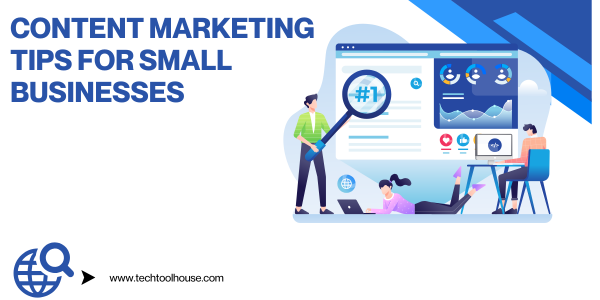Content marketing is an essential strategy for small businesses looking to grow and attract more customers. With the right approach,
Whether you’re new to Content Marketing Tips for Small Businesses or have tried it before, these tips will help you create content that works.
Why Content Marketing Matters for Small Businesses
Small businesses often face tough competition. But with effective content marketing, they can stand out and build strong relationships with customers. Quality content can drive traffic, boost your search engine ranking, and help you build trust with potential buyers.
According to the Content Marketing Institute, 70% of consumers prefer learning about a company through articles rather than ads. That’s why content marketing is a game-changer for small businesses.
1. Know Your Audience
Understanding your audience is key to creating content that resonates with them. You need to know what problems they face and how your product or service can help. Research your target audience’s interests, needs, and pain points. Use tools like Google Analytics or social media insights to gather data on your audience.
Tip: Create buyer personas to visualize your ideal customers and tailor your content to their specific needs.
- 70% of consumers prefer learning about a company through content rather than through traditional advertisements.
- Businesses with blogs receive 67% more leads than those without one (HubSpot).
2. Create Valuable, Relevant Content
Your content should offer value. Whether it’s educational, informative, or entertaining, it needs to answer questions or solve problems. Write blog posts, produce videos, or share infographics that provide helpful information.
Avoid fluff. Keep your content focused, clear, and actionable. People will only read what they find useful.
Tip: If you sell a product, create how-to guides or tutorials to show potential customers how it works.
3. Focus on SEO
Search engine optimization (SEO) helps your content rank higher in search results. The higher your content ranks, the more people will find it. To optimize your content, include relevant keywords that your audience searches for.
For example, for the keyword “content marketing tips for small businesses,” use it naturally throughout your content. But remember, don’t stuff keywords—focus on providing value instead.
Tip: Use tools like Google Keyword Planner to find keywords related to your business.
4. Use Social Media to Amplify Your Content
Social media platforms are powerful tools for promoting your content. Share your blog posts, videos, or infographics on platforms like Facebook, Instagram, LinkedIn, and Twitter. Social media allows you to connect with a broader audience and drive traffic to your website.
Tip: Don’t just post content; engage with your followers. Respond to comments, join conversations, and encourage user-generated content.
5. Invest in Visual Content
People love visuals. Infographics, images, and videos are more likely to be shared than text-based content. Visual content can explain complex ideas quickly and engage your audience better.
Tip: Include images, charts, or videos in your blog posts to make them more engaging and shareable.
6. Use Email Marketing
Email marketing is one of the most effective ways to stay connected with your audience. Create an email list and send regular updates, newsletters, and special offers to your subscribers. Personalize your emails to make them more relevant to each recipient.
Tip: Use catchy subject lines to increase open rates, and include clear calls to action (CTAs).
7. Post Consistently
Consistency is essential in content marketing. Set a schedule for posting content and stick to it. Whether you post once a week or twice a month, keep a regular cadence. This helps build trust with your audience and keeps them coming back for more.
Tip: Use a content calendar to plan your posts ahead of time.
8. Measure Your Success
Tracking the performance of your content is crucial. Use tools like Google Analytics or social media insights to measure your traffic, engagement, and conversions. This will help you understand what’s working and what needs improvement.
Tip: Regularly review your content strategy and adjust it based on data and feedback.
9. Collaborate with Influencers
Influencer marketing is a great way to extend your reach. Partner with influencers who have an audience that aligns with your brand. This can help you gain credibility and attract more followers.
Tip: Start with micro-influencers to keep costs low and build authentic partnerships.
10. Repurpose Content
Don’t let your content go to waste. Repurpose blog posts into videos, podcasts, or infographics. You can also update old content to keep it fresh and relevant. Repurposing saves time and allows you to reach a wider audience.
Tip: Turn your most popular blog posts into downloadable guides or eBooks.
Frequently Asked Questions (FAQs)
1. What is content marketing for small businesses?
Content marketing for small businesses involves creating and sharing valuable content to attract and engage customers. This can include blog posts, videos, social media posts, and more.
2. How often should I post content?
It depends on your business and resources, but posting consistently is crucial. Aim for at least one post a week to keep your audience engaged.
3. What is SEO, and how does it help my business?
SEO (Search Engine Optimization) helps your content rank higher in search results. It involves optimizing your content with relevant keywords to increase visibility.
4. Do I need to be on every social media platform?
Not necessarily. Focus on the platforms where your target audience is most active. Start with one or two platforms and expand as you grow.
5. How do I measure the success of my content marketing efforts?
Use tools like Google Analytics and social media insights to track metrics such as website traffic, engagement, and conversions. This will help you adjust your strategy.

